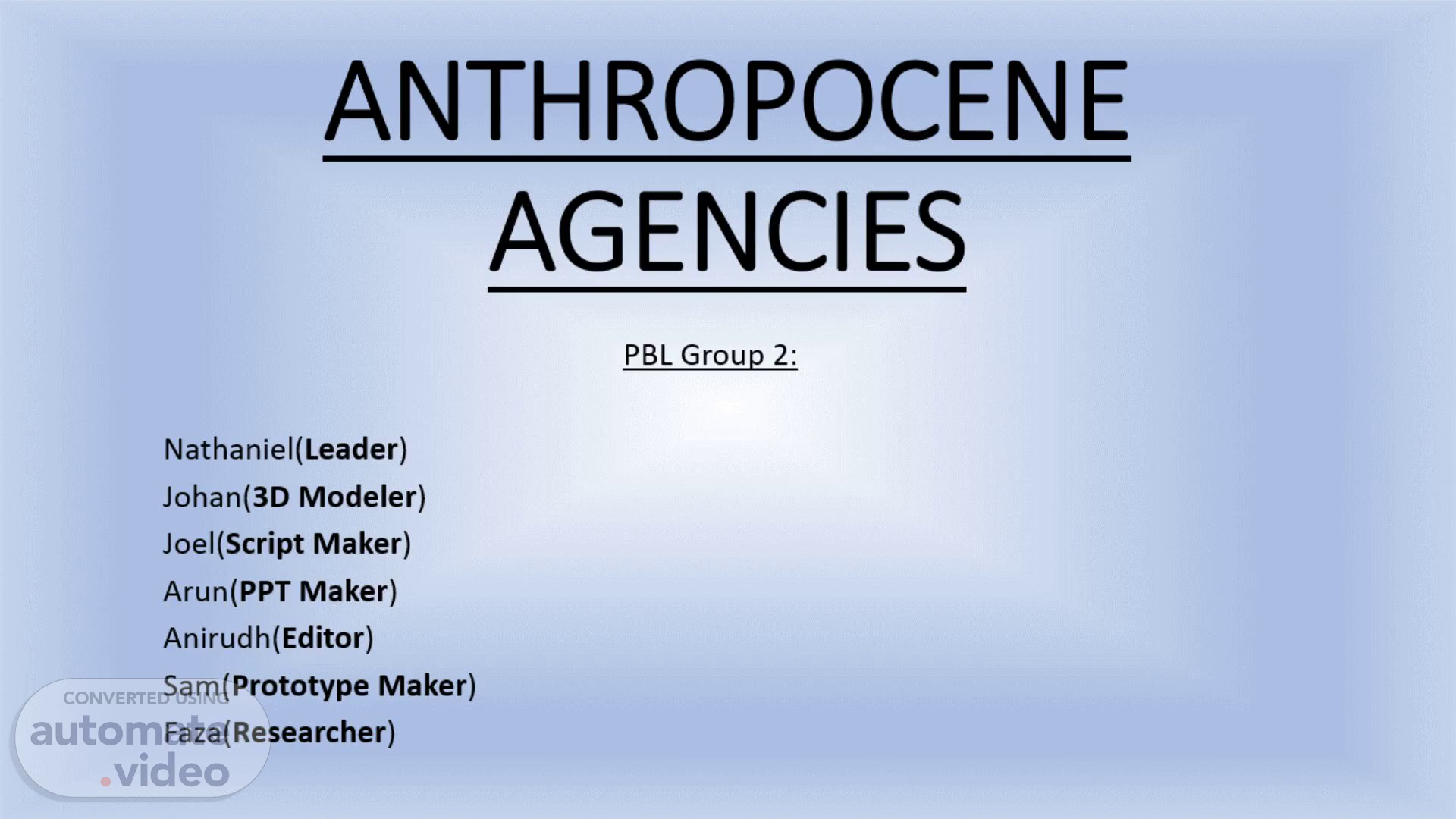
Page 1 (0s)
[Audio] ANTHROPOCENE AGENCIES PBL Group 2: Nathaniel(Leader) Johan(3D Modeler) Joel(Script Maker) Arun(PPT Maker) Anirudh(Editor) Sam(Prototype Maker) Faza(Researcher).
Page 2 (16s)
[Audio] WHAT IS ANTHROPOCENE AGENCIES? Anthropocene agencies refers to the actions and behaviors of humans that are profoundly influencing the Earth's environment and ecosystems during the Anthropocene epoch, which is the current geological age marked by significant human impact on the planet. These human activities include industrialization, urban expansion, agriculture, deforestation, pollution etc. These activities have led to widespread changes in the Earth's climate, loss of biodiversity, alteration of landscapes, and disruptions to natural cycles like the water cycle and nutrient cycling..
Page 3 (57s)
[Audio] WHY DO WE NEED ANTHROPOCENE AGENCIES? Understanding Anthropocene Agencies is crucial because these human activities have profound and widespread effects on our planet's health and sustainability. Here's why they are important: · Environmental Impact: Anthropocene agencies, such as industrial activities, agriculture, and urbanization, significantly alter natural ecosystems. These activities contribute to climate change, biodiversity loss, pollution of air and water, and degradation of landscapes. Recognizing these impacts is essential for implementing measures to mitigate environmental damage and protect vulnerable ecosystems. · Human Health: Many anthropocene activities lead to environmental pollution, which poses risks to human health through air and water contamination, exposure to toxins, and disruptions to food and water sources. Understanding and addressing these agencies is vital for reducing health risks and promoting public well-being. · Sustainability: Studying anthropocene agencies helps us develop sustainable practices. This includes using renewable energy sources, practicing responsible resource management, reducing waste and pollution, and promoting conservation efforts. These actions are critical for minimizing our ecological footprint and ensuring the availability of natural resources for future generations. In essence, understanding anthropocene agencies is key to addressing environmental challenges, protecting human health, and promoting long-term sustainability for both ecosystems and societies worldwide..
Page 4 (2m 40s)
[Audio] HOW DO ANTHROPOCENE AGENCIES MAKE AN IMPACT ON UNDER-DEVELOPED COUNTRIES?(DRIVING QUESTION) Anthropocene Agencies, which are the human activities influencing the Earth's environment, can have significant impacts on under-developed countries in several ways: Environmental Degradation: Activities like industrial pollution, deforestation, and unsustainable agriculture degrade local ecosystems, threatening biodiversity and natural resources crucial for livelihoods. Health Impacts: Pollution from these activities can lead to poor air and water quality, increasing the risk of respiratory diseases and waterborne illnesses among vulnerable populations. Economic Vulnerability: Reliance on natural resources makes under-developed countries susceptible to disruptions caused by habitat destruction, resource depletion, and climate change, affecting economic stability and development opportunities. Social Disparities: Anthropocene agencies can exacerbate social inequalities in under-developed countries. Large-scale industrial projects and resource extraction activities may displace indigenous communities and marginalized groups from their lands, disrupting their livelihoods and cultural heritage. Global Inequity: Under-developed countries bear a disproportionate burden of global environmental impacts despite contributing minimally to global greenhouse gas emissions and other stressors. This inequity underscores the need for international cooperation and support to address environmental challenges and promote sustainable development in these regions. In summary, understanding the impacts of Anthropocene Agencies on under-developed countries highlights the urgent need for sustainable practices, resilient infrastructure, and equitable global partnerships to mitigate environmental degradation, protect public health, and promote inclusive economic growth..
Page 5 (4m 47s)
[Audio] About Anthropocene Agencies What is the government doing about Anthropocene Agencies? Governments and policymakers are pivotal in shaping the Anthropocene through legislation and policy. By setting regulations, providing incentives for green technologies, and participating in international agreements, governments can steer national and global efforts toward sustainability. Effective policies on renewable energy, conservation, and carbon reduction are essential for mitigating climate change and protecting ecosystems..
Page 6 (5m 17s)
[Audio] Different types of Anthropocene Agencies The Ministry of Climate Change and Environment, or MOCCAE, is at the forefront of the UAE, environmental efforts. MOCCAE is responsible for developing and implementing policies on climate change, biodiversity, and sustainable development. Through initiatives like the National Climate Change Plan and the UAE Green Agenda, MOCCAE aims to reduce greenhouse gas emissions, promote renewable energy, and enhance ecological conservation..
Page 7 (5m 47s)
[Audio] Survey Link https://forms.office.com/pages/responsepage.aspx?id=gENNZk1Nw0yUf0PCq4224Z5HlwCqRJ1InTvNRgcBvlhUMTRCRjRQTlo5UjhGR1FXUENKVTc1UFVWTS4u.